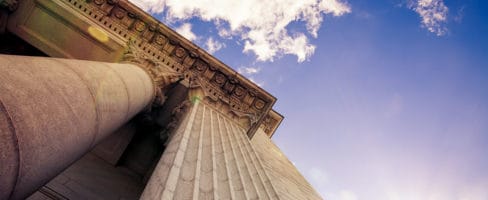Podcast: Play in new window | Download
Subscribe: RSS

Jesus on Trial
 In John chapter 5, Jesus graciously heals a man who had been lame for 38 years, and this man’s lameness is presented as a symbol of our spiritual inability. Just as we’re spiritually blind towards God and can’t even see his kingdom unless we’re first granted new life, so too all of us by nature are unable to walk in his paths or climb our way up to heaven. As the authorities interrogate Jesus in this chapter for healing this disabled man, Jesus turns the tables on his accusers by revealing himself to be their ultimate Judge. Not only is he able to raise up the lame and to make them walk, but he’s also the one who will “raise up the dead and give them life.”
In John chapter 5, Jesus graciously heals a man who had been lame for 38 years, and this man’s lameness is presented as a symbol of our spiritual inability. Just as we’re spiritually blind towards God and can’t even see his kingdom unless we’re first granted new life, so too all of us by nature are unable to walk in his paths or climb our way up to heaven. As the authorities interrogate Jesus in this chapter for healing this disabled man, Jesus turns the tables on his accusers by revealing himself to be their ultimate Judge. Not only is he able to raise up the lame and to make them walk, but he’s also the one who will “raise up the dead and give them life.”
Show Quote:
Shane Rosenthal: John 5 has a lot of legal language. The frequency of key forensic terms suggest that it can be seen as a defense in an interrogation or trial. To judge occurs twice. To witness is employed seven times, and testimony is used four times.
Craig Marshall: It’s really helpful to have that type of language pointed out. It’s not something that I noticed upon a first reading of that. I like how it starts with them interrogating the man who was healed, and then he shifts it to Jesus. Go talk to that guy. And then Jesus, ultimately, turns the tables on the accusers. It’s quite a progression.
Term to Learn:
“Good Works”
1. Good works are only such as God hath commanded in His holy Word, and not such as, without the warrant thereof, are devised by men, out of blind zeal, or upon any pretense of good intention.
2. These good works, done in obedience to God’s commandments, are the fruits and evidences of a true and lively faith: and by them believers manifest their thankfulness, strengthen their assurance, edify their brethren, adorn the profession of the gospel, stop the mouths of the adversaries, and glorify God, whose workmanship they are, created in Christ Jesus thereunto, that, having their fruit unto holiness, they may have the end, eternal life.
3. Their ability to do good works is not at all of themselves, but wholly from the Spirit of Christ. And that they may be enabled thereunto, beside the graces they have already received, there is required an actual influence of the same Holy Spirit to work in them to will, and to do, of His good pleasure: yet are they not hereupon to grow negligent, as if they were not bound to perform any duty unless upon a special motion of the Spirit; but they ought to be diligent in stirring up the grace of God that is in them.
(From the Westminster Confession of Faith, Chapter 16, Sections 1-3, “Of Good Works”)
This week’s key passage:
After this there was a feast of the Jews, and Jesus went up to Jerusalem.
2 Now there is in Jerusalem by the Sheep Gate a pool, in Aramaic called Bethesda, which has five roofed colonnades.3 In these lay a multitude of invalids—blind, lame, and paralyzed.5 One man was there who had been an invalid for thirty-eight years.6 When Jesus saw him lying there and knew that he had already been there a long time, he said to him, “Do you want to be healed?”7 The sick man answered him, “Sir, I have no one to put me into the pool when the water is stirred up, and while I am going another steps down before me.”8 Jesus said to him, “Get up, take up your bed, and walk.”9 And at once the man was healed, and he took up his bed and walked.
Now that day was the Sabbath. 10 So the Jews said to the man who had been healed, “It is the Sabbath, and it is not lawful for you to take up your bed.”11 But he answered them, “The man who healed me, that man said to me, ‘Take up your bed, and walk.’”12 They asked him, “Who is the man who said to you, ‘Take up your bed and walk’?”13 Now the man who had been healed did not know who it was, for Jesus had withdrawn, as there was a crowd in the place.14 Afterward Jesus found him in the temple and said to him, “See, you are well! Sin no more, that nothing worse may happen to you.”15 The man went away and told the Jews that it was Jesus who had healed him.16 And this was why the Jews were persecuting Jesus, because he was doing these things on the Sabbath.17 But Jesus answered them, “My Father is working until now, and I am working.”
18 This was why the Jews were seeking all the more to kill him, because not only was he breaking the Sabbath, but he was even calling God his own Father, making himself equal with God.
19 So Jesus said to them, “Truly, truly, I say to you, the Son can do nothing of his own accord, but only what he sees the Father doing. For whatever the Father does, that the Son does likewise.20 For the Father loves the Son and shows him all that he himself is doing. And greater works than these will he show him, so that you may marvel. 21 For as the Father raises the dead and gives them life, so also the Son gives life to whom he will.22 For the Father judges no one, but has given all judgment to the Son,23 that all may honor the Son, just as they honor the Father. Whoever does not honor the Son does not honor the Father who sent him.24 Truly, truly, I say to you, whoever hears my word and believes him who sent me has eternal life. He does not come into judgment, but has passed from death to life.
25 “Truly, truly, I say to you, an hour is coming, and is now here, when the dead will hear the voice of the Son of God, and those who hear will live. 26 For as the Father has life in himself, so he has granted the Son also to have life in himself. 27 And he has given him authority to execute judgment, because he is the Son of Man. 28 Do not marvel at this, for an hour is coming when all who are in the tombs will hear his voice29 and come out, those who have done good to the resurrection of life, and those who have done evil to the resurrection of judgment. (John 5:1-29)
(This podcast is by White Horse Inn. Discovered by Christian Podcast Central and our community — copyright is owned by the publisher, not Christian Podcast Central, and audio is streamed directly from their servers.)